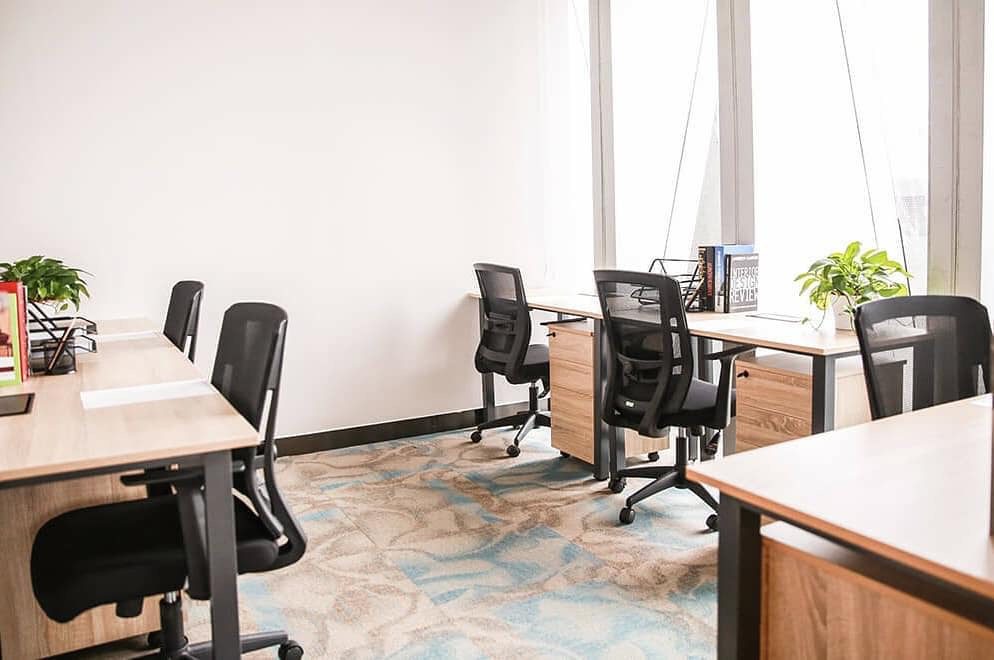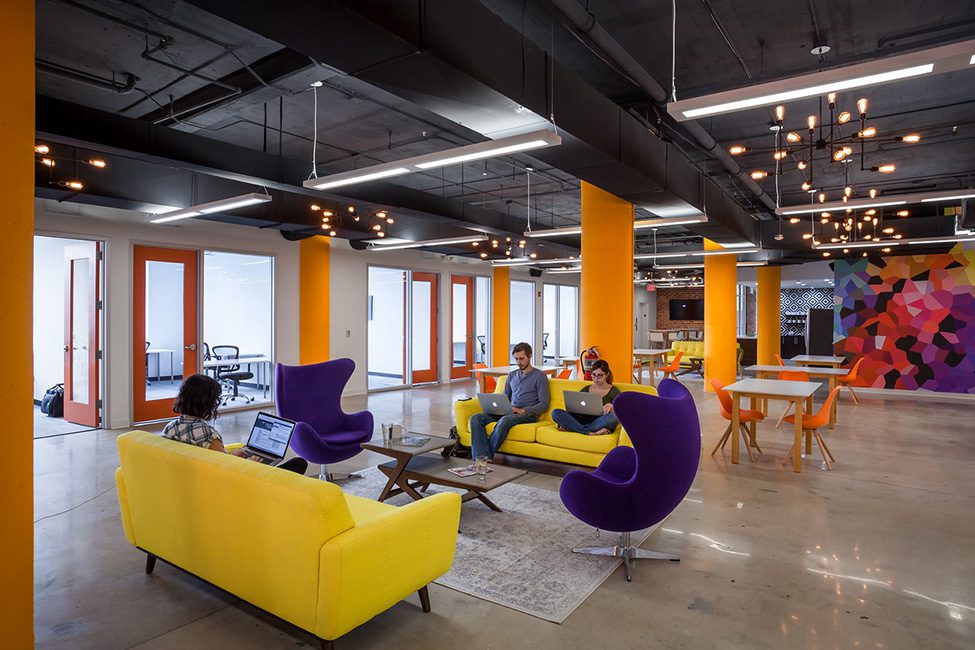In an ever-evolving world of remote work, the question of where to work has become increasingly important. It influences employee well-being, productivity, and engagement.
A positive work environment fosters creativity, collaboration, and communication, contributing to a healthy company culture. It also plays a role in attracting and retaining talent, shaping brand image, and ensuring physical health and safety. Recognizing and prioritizing a conducive work environment is essential for employee satisfaction and organizational success in today’s dynamic workplace.
Let’s explore the pros and cons of three primary options: working from home, embracing a coworking space, or opting for a small office space.
Working From Home

The allure of working from the comfort of one’s home is undeniable. The advantages are clear:
- Flexibility and Comfort: Home offers the ultimate flexibility regarding your workspace. You can customize it to your liking, ensuring that your work environment aligns perfectly with your preferences.
- Cost Savings: Working from home can translate into substantial cost savings. No more daily commutes means less spent on gas, public transportation, or parking fees. Plus, you can say goodbye to daily lunch expenses.
- Elimination of Commute: The most immediate benefit of working from home is the elimination of a daily commute. This saves time, reduces stress, and contributes to a more environmentally friendly lifestyle.
However, it’s not all sunshine and rainbows:
- Isolation and Loneliness: Working from home can lead to feelings of isolation and loneliness. The absence of daily interactions with colleagues can be mentally taxing, impacting social well-being.
- Distractions and Lack of Focus: Home environments come with their own set of distractions – household chores, family members, or even the allure of a cozy couch. Maintaining focus can be a daily challenge.
- Blurred Work-Life Boundaries: Without a clear separation between home and office, remote workers might find it challenging to establish boundaries. Overworking becomes a common pitfall.
Remote work can be a wonderful opportunity, but it requires careful balance and adaptability to fully reap its benefits while addressing its drawbacks.
Coworking Spaces

For those seeking a professional atmosphere and the camaraderie of like-minded individuals, coworking spaces are a smart choice:
- Networking Opportunities: Coworking spaces are hubs of networking opportunities. You’ll find yourself surrounded by diverse professionals from various industries, opening doors to new connections and potential collaborations.
- Professional Atmosphere: The presence of fellow professionals creates a conducive environment for focused work. The atmosphere can be particularly motivating and can boost productivity.
- Enhanced Productivity: Coworking spaces are designed to minimize distractions. They offer amenities like dedicated workstations, meeting rooms, and high-speed internet to improve productivity.
However, there are considerations to keep in mind:
- Cost: While coworking spaces offer numerous benefits, they come at a price. Membership fees can vary, and the expense might not align with every remote worker’s budget.
- Lack of Privacy: Coworking spaces provide a shared environment, which means limited privacy. This can be a concern for those handling sensitive information or tasks that require intense concentration.
- Commuting to the Coworking Location: For some remote workers, the need to commute to a coworking space might negate some of the convenience remote work offers.
At the end of the day, the decision to use a coworking space should be based on individual needs and priorities, as it can be a beneficial choice for some remote workers while not the right fit for others.
Small Office Space

For those who value privacy and control over their workspace, small office space rentals are an appealing option:
- Privacy and Control: A dedicated small office space allows complete privacy and control over the work environment. It’s your space, tailored to your needs.
- Enhanced Focus and Productivity: The absence of external distractions fosters deep concentration and productivity. It’s an environment where work can truly take center stage.
- Brand Identity and Professionalism: A small office space can convey professionalism and brand identity. It’s a physical representation of your commitment to your work.
However, there are trade-offs:
- Higher Overhead Costs: Renting or owning a small office space comes with higher overhead costs. These include rent, utilities, and maintenance expenses.
- Limited Networking Opportunities: Small office spaces are typically isolated, limiting networking opportunities compared to coworking spaces.
- Potential for Isolation: While privacy is an advantage, it can also lead to isolation. Remote workers in small office spaces may miss out on the social interactions available in coworking spaces.
Making the Right Choice
Choosing the right workspace is a decision influenced by several factors:
- Nature of the Work: The nature of one’s work plays a significant role in the choice of workspace. Those requiring intense concentration or privacy may lean toward small office spaces, while collaborative projects may benefit from coworking environments.
- Budget: Budget considerations are crucial. Remote workers need to assess their financial resources and determine the affordability of their chosen workspace.
- Social Preferences: Some remote workers thrive in social settings, while others prefer solitude. Understanding one’s social preferences is essential.
- Future Growth Prospects: Consider future growth prospects and the scalability of the chosen workspace. What works today may need adjustments tomorrow.
Future Trends in Workspaces

Rapid technological advancements, changing employee expectations, and the lessons learned from the COVID-19 pandemic are reshaping how and where we work.
Coworking spaces, which gained prominence in recent years, will continue to flourish. However, they will diversify to offer tailored solutions for different industries and needs. On-demand office booking platforms will become more prevalent, allowing workers to find and reserve workspace as needed.
Employee well-being is taking center stage in workspace design. Future offices will prioritize natural lighting, ergonomic furniture, green spaces, and wellness rooms. These elements are essential for maintaining physical and mental health, reducing stress, and boosting productivity.
The integration of technology will continue to drive workspace innovation. Smart offices will become the norm, featuring IoT devices for efficient energy use, room booking apps, and AI-driven personal assistants. Augmented reality (AR) and virtual reality (VR) will facilitate virtual meetings, training, and collaboration, reducing the need for physical presence.
These trends are blurring the line between these different workspaces, so it is normal to encounter hybrid office setups.
Conclusion
Ultimately, the choice of where to work as a remote worker is a deeply personal one. It involves weighing the pros and cons of each option against individual needs and circumstances. There’s no one-size-fits-all solution, and the ideal workspace can evolve over time. As remote work redefines our approach to work, the flexibility to adapt and choose the suitable workspace for any given moment is one of its most significant advantages.

Enterprise software development experience. More recently in positions including CTO, Lead Developer and Head of Product in Australia. Deep expertise in property and legal technology in Australia with a specialty in lead generation and tech scalability across Asia-Pacific.